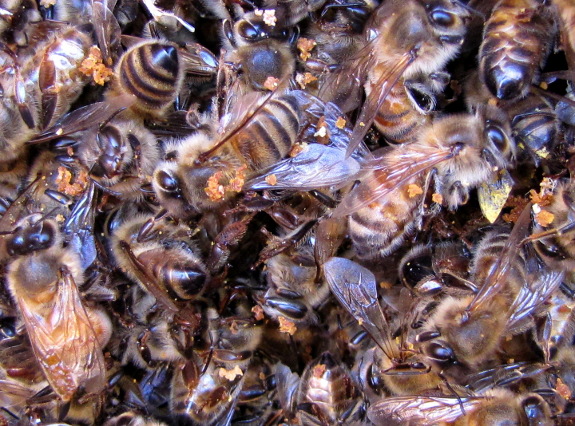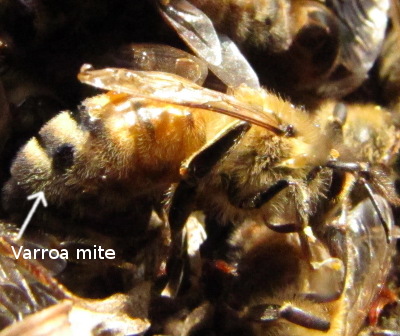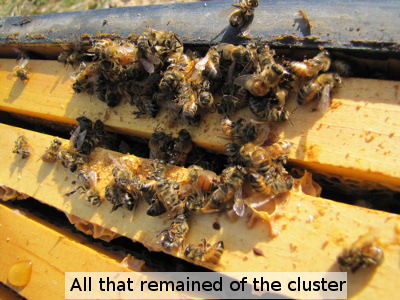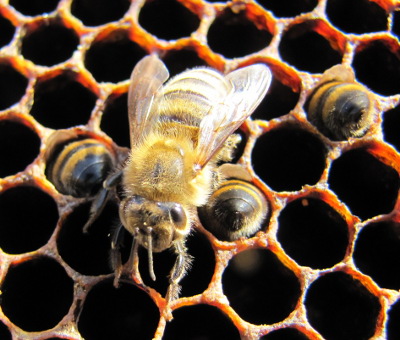
Dead hive

We had our first ever
bee hive casualty this month...and it's all my fault. I would
love to follow the lead of modern beekeepers and blame the death of
hundreds of bees on colony collapse disorder, but I'm pretty sure the
problem was mismanagement.
 This
was my prize hive that began 2010 with double deeps, bulked up its colony in
record time, and socked away nearly our entire year's harvest of
honey. When I checked them at the beginning of November, they had
about 84 pounds of honey --- more than any other hive --- but I was a
bit concerned because the
hive's varroa mite numbers were also high (180 mites per day in
September, declining to 74 mites per day in November.) I
considered either using an organic or chemical varroa mite treatment,
but in the face of insufficient data on how many mites is too many, I
instead decided to test my boundaries and see how the bees survived the
winter.
This
was my prize hive that began 2010 with double deeps, bulked up its colony in
record time, and socked away nearly our entire year's harvest of
honey. When I checked them at the beginning of November, they had
about 84 pounds of honey --- more than any other hive --- but I was a
bit concerned because the
hive's varroa mite numbers were also high (180 mites per day in
September, declining to 74 mites per day in November.) I
considered either using an organic or chemical varroa mite treatment,
but in the face of insufficient data on how many mites is too many, I
instead decided to test my boundaries and see how the bees survived the
winter.
 Maybe
they had too many mites, but I don't think that's what killed
them. I was so confident in our hives' honey stores in early
November that I skipped a month and didn't check on them until December
30. At that time, the writing was already on the wall --- the
bottom of the hive was littered with a thick carpet of dead bees and
the cluster looked too small to cope with this winter's abnormally cold
temperatures. Sure enough, when sun returned on January 16 and
bees came flying out of the other two hives, my prize hive was
silent. I pried the lid off and found a hive full of dead bees.
Maybe
they had too many mites, but I don't think that's what killed
them. I was so confident in our hives' honey stores in early
November that I skipped a month and didn't check on them until December
30. At that time, the writing was already on the wall --- the
bottom of the hive was littered with a thick carpet of dead bees and
the cluster looked too small to cope with this winter's abnormally cold
temperatures. Sure enough, when sun returned on January 16 and
bees came flying out of the other two hives, my prize hive was
silent. I pried the lid off and found a hive full of dead bees.
 My autopsy turned up only a
couple of varroa mites clinging to dead bees, but lots of bees with
their heads poking into empty honey comb, desparate for
dinner. There was plenty of honey left, but the problem is that
it was too far from their cluster for the bees to eat during December
and January's long spells of sub-freezing weather. When I checked
on the hive two weeks ago, I noticed that the bottom brood box (where
the bees were) was nearly out of honey, so I moved a bunch of full
frames down from above. Too late. None of the fresh honey
was touched, and I suspect the colony died soon after I checked on them
in December.
My autopsy turned up only a
couple of varroa mites clinging to dead bees, but lots of bees with
their heads poking into empty honey comb, desparate for
dinner. There was plenty of honey left, but the problem is that
it was too far from their cluster for the bees to eat during December
and January's long spells of sub-freezing weather. When I checked
on the hive two weeks ago, I noticed that the bottom brood box (where
the bees were) was nearly out of honey, so I moved a bunch of full
frames down from above. Too late. None of the fresh honey
was touched, and I suspect the colony died soon after I checked on them
in December.
Shun the fault I fell
in! Don't be lulled into a false sense of security by a fall
check with copious honey. Especially if you have a hive with a
very large bee population, check in at least once a month (or more
often!) and move honey around as needed to make sure the bees have
plenty of food right in their living rooms.
I'm trying not to be too
heartbroken by the loss, and to instead consider it a learning
opportunity. After all, this makes up my mind --- I'm definitely
going to have to learn to propagate hives this year.
Want more in-depth information? Browse through our books.
Or explore more posts by date or by subject.
About us: Anna Hess and Mark Hamilton spent over a decade living self-sufficiently in the mountains of Virginia before moving north to start over from scratch in the foothills of Ohio. They've experimented with permaculture, no-till gardening, trailersteading, home-based microbusinesses and much more, writing about their adventures in both blogs and books.
Want to be notified when new comments are posted on this page? Click on the RSS button after you add a comment to subscribe to the comment feed, or simply check the box beside "email replies to me" while writing your comment.

Thanks for your condolences! Losing one hive out of three over the winter is supposed to be pretty average, but I didn't lose any last winter, and I had high hopes I'd keep up the good work...
I don't think that bees are harder to learn than other livestock, but the timeline feels more like learning about fruit trees. I get feedback from my chickens every day in the number of eggs they lay, how perky they look, etc., but I really only get an idea for how well the hive is doing a few times a year. Maybe in a couple of decades I'll be an expert! I do thoroughly recommend them, though --- they're pretty low work and very rewarding.
I'm currently reading Natural Beekeeping, so I figure in a few days I'll have a more specific answer. My uneducated goal at the moment is to find a way to split one or both of our current hives so that we'll have three to four hives this year. (I'll probably split just one since my gut feeling is that splitting a hive takes a lot of energy on their part, and I do want to get a bit of honey in 2011.)
I'll probably use the honey to help the hives bulk up faster, or for the new (hypothetical) hive to eat as they grow new workers. If there's any left over, I'll extract it, but I'd rather push that honey back into the food cycle of the apiary and make them stronger.